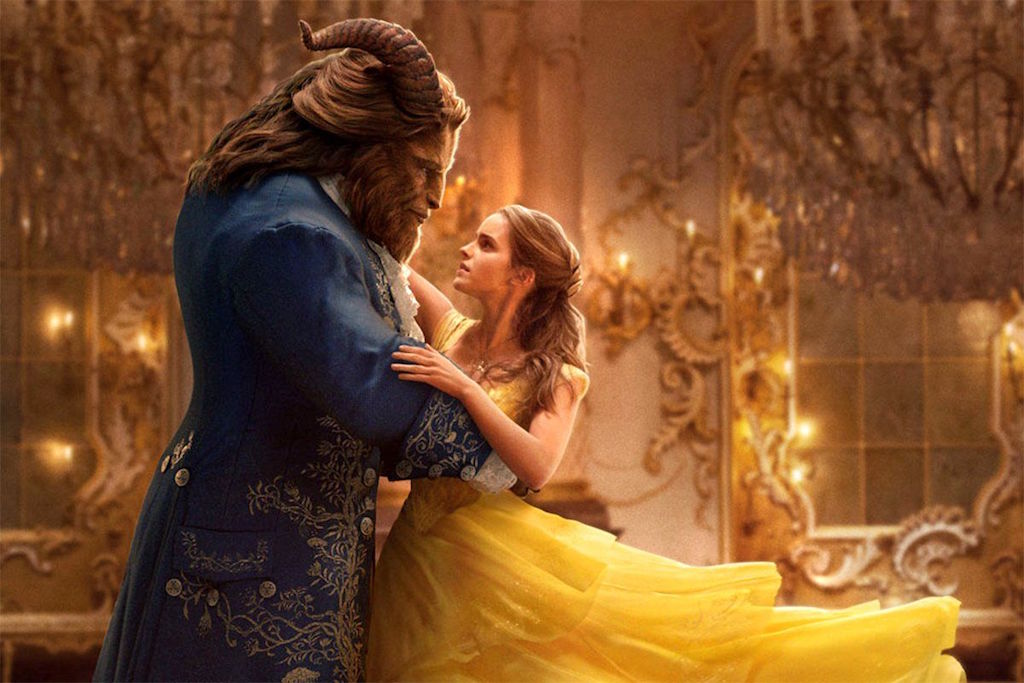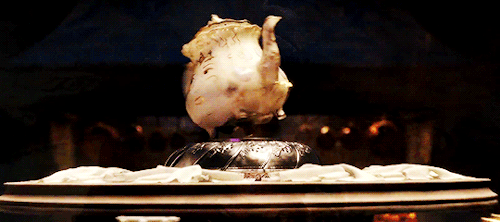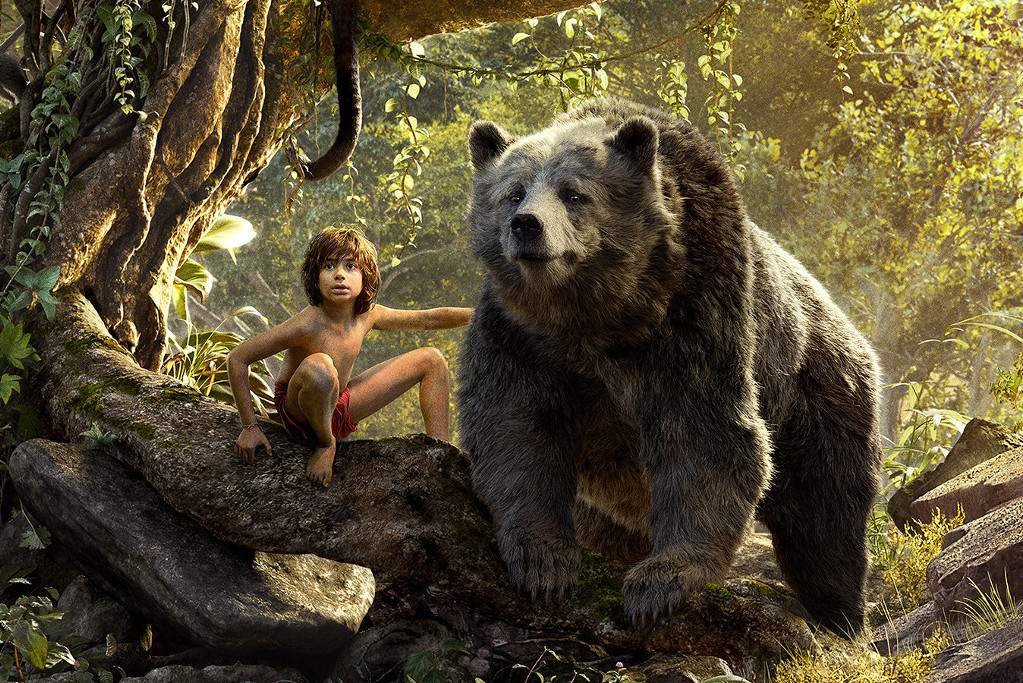Don’t Worry About The Haters, ‘Beauty And The Beast’ Is Unfussy, Unadulterated Joy
"I expected to hate this carbon-copy film... Once I cracked a grin, it barely left my face."

Disney’s new live-action Beauty and the Beast opens — unlike the original cartoon — on a French ballroom, vibing a distinct let them eat cake sensibility. There are voluminous gowns, powdered wigs, fussy bows and the fabulous Audra McDonald regaling us with an aria. An impossibly silly Dan Stevens (our Prince in pre-Beast mode) holds court, sneering and foppish.
Colourful, camp and clever, the opening surprises me. I’d entered the cinema intent on hating this carbon-copy film. Flashbacks of my harrowing experience at Disney’s live-action Cinderella (unbearable, simpering and insipid) reeled around my head. I also had the distinct feeling, from the recent slew of Beauty and the Beast trailers clogging my newsfeed, that Disney was schilling me the film equivalent of a pleather knock-off handbag and calling it Gucci.
The new Beauty and the Beast may not be Gucci exactly, but it’s no knock-off. It’s its own distinct and surprising creation — a totally joyous one at that.
A Tale As Old As Time?
Beauty and the Beast is far from the first Disney cartoon to get the live-action treatment. It was way back in 1996 that Glenn Close fronted the much-loved remake of 101 Dalmations (penned, if you’ll believe it, by 1980s teen-film titan John Hughes). But, recently, Disney has gone gangbusters on the reboots.
After discovering that audiences will reach deep into their pockets for any remake of an animated favourite, Disney has put into production adaptations of Snow White and the Seven Dwarfs, Peter Pan, Sleeping Beauty, Cinderella, Alice in Wonderland, The Jungle Book, The Lion King, Mulan, The Little Mermaid and Aladdin. (They have sensibly steered clear of a remake of the grossly inaccurate and frankly insulting Pocahontas, which depicts romance in the place of child rape, kidnapping and death by diphtheria.) Beauty and the Beast is just one in this long line, but it was perhaps the most anticipated so far. This original was a favourite of Disney’s new target audience: nostalgia-hungry millennials like you and me.
The desire for nostalgia is important because it is absolutely what’s driving this machine of reinvention. There is something comforting about being told a story with which we are already familiar. Disney has witnessed how we will stand to attention when they tempt us with even a pale imitation of a once-beloved relic of our childhood. It wouldn’t be a gross overgeneralisation to judge that none of these reboots have been exactly good (with the exception of Jon Favreau’s exquisite The Jungle Book), but we will see them anyway — and in droves.
Though it’s touted as a “tale as old as time”, Beauty and the Beast has come with some reservations in 2017. Many fans were sceptical about how the story — of a woman incarcerated by her soon-to-be lover — has dated as we increasingly advocate for the plight of women in the stories we tell. What kind of message does it send to have a young woman fall in love with her tormentor?
Beauty and the Beast addresses these fears with a dash of modern gumption that I didn’t expect from such a nostalgia-laced project. The first smart move was casting Emma Watson, who is famous for both portraying Harry Potter’s bookish heroine Hermione, and acting as a real-life advocate for women’s issues as the UN’s Ambassador for the He for She program. Whether or not you believe in her social politics, Watson’s appointment as Belle in this new film sends a strong message about how Disney intends to make real the closest thing they have to a ~woke~ cartoon princess.
In this film, Belle is fully realised, feisty and frank. She is a renegade reading revolutionary — covertly borrowing books from a church, teaching girls to read against village advice, and inventing slapdash washing machines to manage her chores. The filmmakers do a clever job of melding Watson’s real-life persona with the outspoken Belle, and the film is better and more contemporary for it. They also succeed — where Kenneth Bragnagh’s Cinderella failed dismally — in providing us with a love story to, if not root for (the man is an actual Beast, after all), then certainly believe.
Cinderella and her Prince Charming, as portrayed by TV stars Lily James and Richard Madden, were certainly very fine-looking but their chemistry was in the negative digits. When thrown together Watson and Dan Stevens — once you get past all the poorly rendered CGI and prosthetics — are quite enchanting together. Screenwriters Stephen Chbosky (The Perks of Being A Wallflower) and Evan Spiliotopoulos have shrewdly drawn from our most beloved prickly love story, Pride and Prejudice, to present a convincing narrative of opposites-attract romance. Belle and her Beast bicker and bond over favourite Shakespeare plays and secrets from their past, squabbling their way into something like love.
The Best And Worst Of It
The essentials of the original story remain the same: a selfish prince (Stevens) is cursed and turned into a beast, and his servants are transformed into anthropomorphised household objects. The spell can only be broken when the Beast learns to love another, and earns their love in return. Lucky for Beast and his household, a mishap with a stolen rose in a garden leads our heroine, Belle to offer herself as a prisoner for life to the Beast in exchange for her father Maurice’s (Kevin Kline) freedom. Meanwhile Belle’s suitor, the boorish Gaston (Luke Evans), pursues Belle and threatens to endanger the safety of Belle’s father and the Beast in his quest to make her his bride.
The casting here is very good. Watson and Stevens are joined in the castle by a raft of bonafide movie stars: Ewan McGregor (proving once and for all that a Scottish man should never attempt a French accent) is the loquacious candlestick Lumiere, Sir Ian McKellan blusters and grumbles admirably as the clock Cogsworth (his true form is clearly as the Grand Old Man of any film), the stunning Gugu Mbatha-Raw is the French feather duster Plumette (formerly Babette), and Stanley Tucci voices a pompous grand piano. The only actor who could have possibly matched Angela Lansbury’s iconic Mrs Potts has also been called to arms: the wonderful Emma Thompson’s warm, rich voice warbles a commendable “tale as old as time” as the matronly teapot.

Yaaa-hey, hold up, what’s wrong with her face?
I was a little rankled by the CGI, which takes a good deal of time to get used to — squished up features of famous actors affixed to household objects has a very Twilight Zone feel. However, the excellent voicework saves it; I especially enjoyed the repartee between McGregor’s Lumiere and McKellan’s Cogsworth.
The only time it doesn’t work at all is during the film’s showstopping number, ‘Be Our Guest’. The sight of CGI plates swirling around Watson’s head is the very opposite of spectacular. But the castle fight scene is vibrant and humorous, and the music is, for the most part, well-produced. Watson can certainly carry a tune, although, like many screen actors asked to sing on film, her voice is a little too flat, a little too thin and far too auto-tuned.
As for the rest of the humans, they’re all great: Klein is an excellent, kindly Maurice, though he is forced to sing a sickly and unnecessary duet with Watson’s Belle at the start. But the standouts are truly Luke Evans and Josh Gad as Gaston and his sidekick Lefou. Evans is perfect as Gaston, with his brilliant booming voice, charming smile and boundless energy. He recalls a little of Hugh Jackman’s infamous turn as the jocular villain onstage in Australia in the ‘90s, but with his own oomph and raw sex appeal. He’s so good, in fact, that the writers have to go further to make Gaston really villainous (I found myself wondering, on several occasions, whether it would really be all that bad to be this Gaston’s wife).
Before the film’s release Disney teased an “exclusive gay moment” for Gad’s Lefou. It’s almost nothing (and potentially hugely insulting — just another fictional gay boy pining after a straight hunk), but there’s plenty to love anyway in Gad’s bright, funny, wonderful minion. Gad and Evans’ big singing moment, ‘Gaston’, which recalls Les Miserables’ garrulous ‘Master of the House’, is a triumph, and because of the failure of ‘Be Our Guest’ it becomes the film’s showshopping number by default. It is sheer cheek and charm. This was the first moment I truly cracked a grin, and it barely left my face afterwards.
My smile was, however, wiped away when Menken and Ashman’s glorious classic score was interrupted by hideous new songs, which I was horrified to discover that Menken wrote alongside Tim Rice. It’s all a bit of a mess, until those original 1991 hits arrive to draw you back in. And really that’s the key; the 1991 animated film was so close to perfect (a soaring height for Disney at a time when they were cranking out hit after hit) that this film has little to do to match its predecessor. Despite a bit of awkwardness, it really is a commendable ode to the mastery of the original.
Though reactions to the film have been generally positive, there are a few cynics who have disliked it heartily. Personally I can’t imagine being anything but charmed by the film, which is so careful and clever in its reconstruction of the original cartoon, but with Condon’s signature nods to the bombastic brassiness of a Broadway show. This is hardly surprising, since Condon wrote the film adaptation of Chicago and directed the movie Dreamgirls, as well as the oddball homoerotic Frankenstein homage, Gods and Monsters.
I can’t help it; I was taken in by all of it. There is an effortlessness to Condon’s filmmaking here, which, despite being swathed in the excess of 18th-century France, is deliberately unfussy. It’s obstinate classicism mixed with a spark of gentle modernity. It’s really just pure joy — fun and feverish enough to sweep you up and take you away from yourself (and your initial reservations).
–
Beauty and the Beast is in cinemas now.
–
Matilda Dixon-Smith is a freelance writer, editor and theatre-maker, and a card-carrying feminist. She also tweets intermittently and with very little skill from @mdixonsmith.
